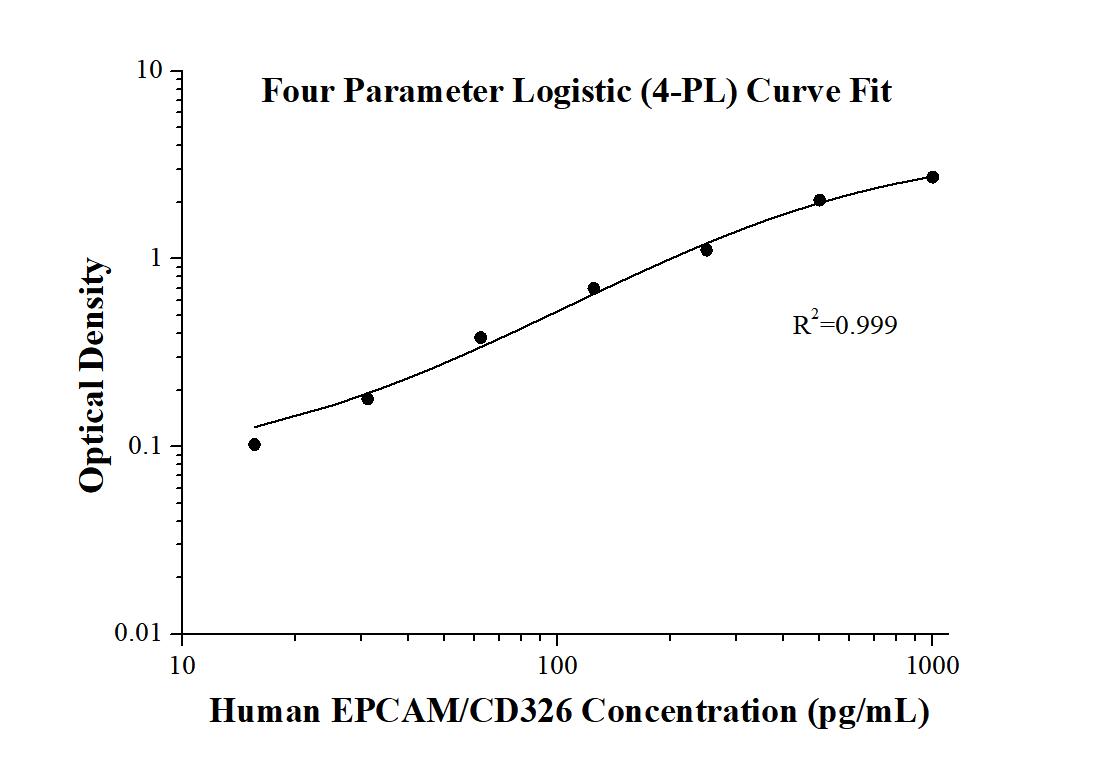Human EPCAM/CD326 ELISA Kit
Cat no : KE00549
Synonyms
EPCAM,Adenocarcinoma-associated antigen,CD326,Cell
Validation Data Gallery
Product Information
KE00549 is a solid phase sandwich Enzyme Linked-Immuno-Sorbent Assay (Sandwich ELISA). The human EPCAM/CD326 ELISA kit is to be used to detect and quantify protein levels of endogenous human EPCAM/CD326. The assay recognizes human EPCAM/CD326. An antibody specific for human EPCAM/CD326 has been pre-coated onto the microwells. The human EPCAM/CD326 protein in samples is captured by the coated antibody after incubation. Following extensive washing, another horseradish peroxidase (HRP)-conjugated antibody specific for human EPCAM/CD326 is added to detect the captured human EPCAM/CD326 protein. For signal development, followed by Tetramethyl-benzidine (TMB) reagent. Solution containing sulfuric acid is used to stop color development and the color intensity which is proportional to the quantity of bound protein is measurable at 450 nm with the correction wavelength set at 630 nm.
| Product name | Human EPCAM/CD326 ELISA Kit |
| Tests | 1 X 96 well plate |
| Sample type | Serum, Plasma, Cell culture supernatant, Cell lysate |
| Assay type | Sandwich |
| Sensitivity | 0.2 pg/mL |
| Range | 15.6-1000 pg/mL |
| Reactivity | Human |
| Tested applications | Sandwich ELISA |
| Gene ID (NCBI) | 4072 |
Recovery
| Sample Type | Average | Range |
|---|---|---|
| Human serum | 90% | 79%-101% |
| Cell culture supernatant | 105% | 100%-109% |
| Cell lysate | 109% | 100%-122% |
IntraAssay
| Sample | n | mean ( pg/mL) | SD | CV% |
|---|---|---|---|---|
| 1 | 8 | 558.1 | 52.1 | 9.3 |
| 2 | 8 | 134.3 | 7.5 | 5.6 |
| 3 | 8 | 36.8 | 2.5 | 6.7 |
InterAssay
| Sample | n | mean ( pg/mL) | SD | CV% |
|---|---|---|---|---|
| 1 | 16 | 541.7 | 49.7 | 9.2 |
| 2 | 16 | 125.1 | 12.7 | 10.1 |
| 3 | 16 | 34.7 | 3.2 | 9.3 |
Background Information
Epithelial cell adhesion molecule (EPCAM), also known as CD326, is a well-characterized type I transmembrane glycoprotein that plays a pivotal role in cell adhesion, proliferation, differentiation, and signaling. It mediates Ca2+-independent homotypic cell-cell adhesion through its extracellular domain, which is crucial for the formation and maintenance of epithelial tissues. The membrane localization of EPCAM is essential for its function in cell adhesion and signaling. Additionally, elevated levels of soluble EPCAM have been associated with tumor burden and poor prognosis in cancer patients, making it a potential biomarker for cancer diagnosis and monitoring.
Properties
| Storage Instructions | All the reagents are stored at 2-8℃ for 6 months or -20℃ for 12 months. Refer to the protocol for further storage instructions. |
| Synonyms | EPCAM,Adenocarcinoma-associated antigen,CD326,Cell |
